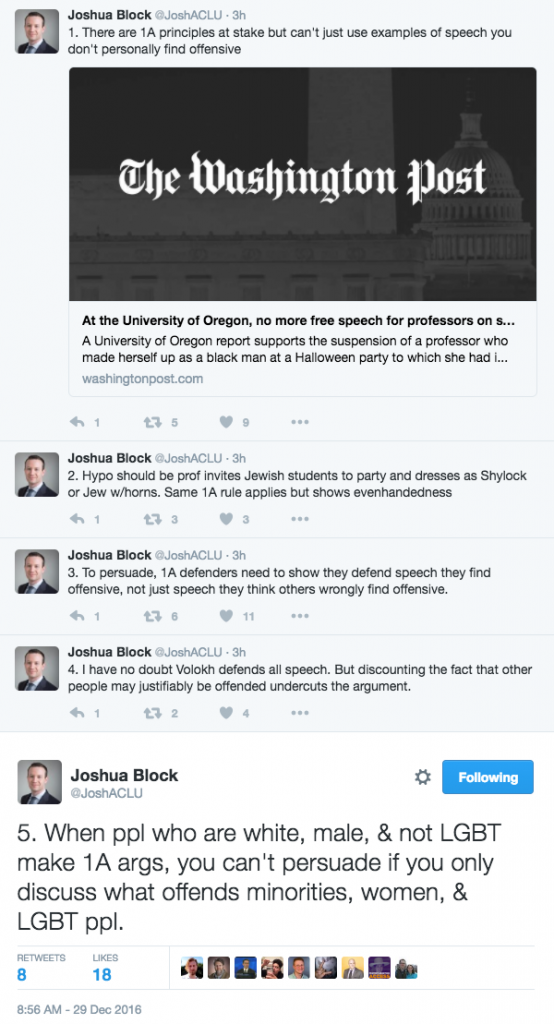When I write about legal issues, I try very hard not to make it personal. That is, I want my arguments to stand by themselves, regardless of who I am, where I was born, who my ancestors are, where I pray, how much money I earn, who I love, etc. None of that should matter. Alas, for many people it does. I’ve heard more times than I can count that because of my “privilege,” I lack the “agency” to write about a host of hot-button social issues. Whether or not the “privilege” argument has any merit on its own, if taken seriously, the result is silence: I can’t speak about a topic unless I have the agency to do so. Part of a broader culture of political correctness, these censorious policies are inimical to academic freedom, and more broadly, the freedom of speech.
It is against this backdrop that I came across a series of tweets from Josh Block this morning. Block criticized a post by Eugene Volokh about the University of Oregon’s punishment of a professor who wore blackface at a private party. (I’ve written about this case at some length, and Eugene quotes me in his post). Block argued that arguments about free speech are less persuasive when the speaker only uses examples he does not “personally find offensive.” Alluding to some Jewish writer, Block suggests that a hypothetical should be about a “prof invites Jewish students to party and dresses as Shylock or Jew w/horns.” (Volokh is Jewish). This would show “evenhandedness.” Block goes on to state that “1A defenders need to show they defend speech they [personally] find offensive, not just speech they think others wrongly find offensive.” Whether or not Volokh “defends other speech,” because “other people may justifiably be offended undercuts [his] argument.” It was his last tweet that raised my hackles: “When ppl who are white, male, & not LGBT make 1A args, you can’t persuade if you only discuss what offends minorities, women, & LGBT ppl.”

I replied:
This is a breathtaking argument from an @ACLU attny – My defense of First Am. is not acceptable unless a non-priv person deems it consistent https://t.co/opl9XcjIMV
— Josh Blackman (@JoshMBlackman) December 29, 2016
Perhaps illustrating Trevor’s Axiom, I received a torrent of tweets from people other than Block, arguing that I misstated Block’s position, and that he spoke about “persuasive” arguments, rather than “acceptable” arguments. Allow me to explain.
Block’s argument, by necessity, requires assessing what the speaker finds, or likely finds, personally offensive. If the speaker is Jewish, then there is the presumption that he will find offensive a professors wearing horns. If the speaker is Catholic, then there is the presumption that he will find offensive a professor dunking a crucifix in urine. If the speaker is Irish, then there is the presumption that he will find offensive a professor dressing up like the Notre Dame mascot. You get my drift. Unless a speaker offers such “evenhandedness” his argument is less “persuasive.” Or as I phrased it in my tweet, the argument is not as acceptable, because some other people–who are not privileged–find the argument undercut.
What a person personally finds offensive is irrelevant to the persuasiveness of an argument. I have no idea what Eugene finds offensive. I almost never get offended because of the internet. It’s dulled me to virtually everything. Why presume that I would find any of these scenarios offensive? I think the professor who does these things acts like an idiot, but so what.
If someone wants to find my arguments unpersuasive, let them do it based on the logic and reasoning in the work–not based on their perception of who I am, or what I find offensive.
This is a philosophical disagreement that I don’t think we will resolve, by tweet, or blog post.